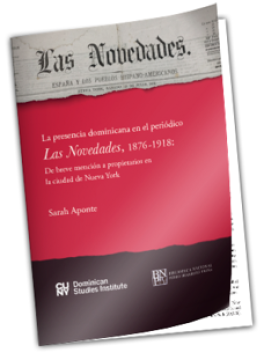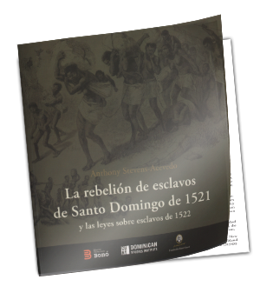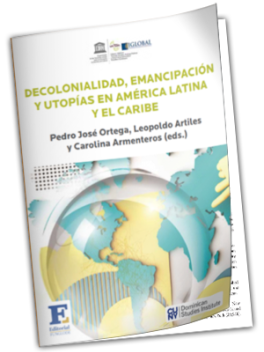The CUNY Dominican Studies Institute has published notable texts in the field of Dominican Studies, among them books, research monographs, working papers and research briefs. Many of them are available for download, free of charge, while others are for purchase. Thank you for your support!
RESEARCH MONOGRAPHS
Ramona Hernández, Francisco L. Rivera-Batiz and Sidie S. Sisay.
Quisqueya in Borinquen: A Socioeconomic Profile of the Dominican Population in Puerto Rico, 2023
2023. 45pp.
This research report provides a comprehensive analysis of the current socioeconomic status of the Dominican population in Puerto Rico, examining changes over time using data from the U.S. Census for Puerto Rico and the Puerto Rico Community Survey.
Ramona Hernández, Francisco L. Rivera-Batiz and Sidie S. Sisay
Dominicans in the United States: A Socioeconomic Profile 2022
2022. 82pp.
This research presents the first detailed study of the socioeconomic status of the Dominican population of the United States as we enter the second decade of the 2000s, using information provided by the American Community Survey, the Current Population Survey and the United States Census.
Paul Austerlitz
The Urban Maroons of Dominican Music
2022. 44pp.
This monograph examines manifestations of Afro-Dominican music, dance, and spirituality in the Dominican Republic and in the United States serving as a powerful counter-narrative of blackness asserting Dominicans’ valorization of their negritude.
Ramona Hernández, Pedro Ortega, Nancy Sohler and Sarah Marrara
Understanding COVID-19 Among People of Dominican Descent in the U.S.: A Comparison of New York, New Jersey, Florida, Massachusetts, Pennsylvania, Rhode Island and Connecticut.
2022. 32pp.
The first research study to examine the experience of people of Dominican origins residing in the United State amidst the COVID-19 pandemic. It is based on a survey with a probabilistic and representative sample of 794 people of Dominican descent across the seven states in which the majority—85%—of Dominicans living in the U.S. resided at the time of the study.
Anthony Stevens-Acevedo
The Santo Domingo Slave Revolt of 1521 and the Slave Laws of 1522: Black Slavery and Black Resistance in the Early Colonial Americas
2019. 65pp.
This volume disseminates for the first time ever a full English translation of a seminal document in the history of Black people in the Americas: the January, 1522 “ordinances on slaves and blacks” issued by the colonial government of La Española or Santo Domingo (known in English as Hispaniola), the first post-1492 European settlement in the Americas and, at the same time, the first black-majority society in the modern Americas and the ancestor society of what is today the Dominican Republic.
Ramona Hernández and Sarah Marrara
Old Places, New Places: Geographic Mobility of Dominicans in the U.S.
2015. 24pp.
The aim of the study is to document internal migration patterns of Dominicans in the U.S., comparing international migrants and domestic migrants.
Anthony Stevens-Acevedo, Tom Weterings and Leonor Álvarez Francés
Juan Rodriguez and the Beginnings of New York City
2013. 65pp.
This study offers a historical overview of the little-known story of Juan Rodriguez, a dark-skinned free man from the Spanish colony of La Española (today the Dominican Republic and the Republic of Haiti) who arrived in the Hudson Harbor in 1613 on board a Dutch ship and stayed there until at least 1614.
Versión en español: Juan Rodríguez y los comienzos de la ciudad de Nueva York. Traducido por Angel Estévez. Publicado en colaboración con el Archivo General de la Nación. Santo Domingo, República Dominicana, 2014.
Raymond Torres-Santos
Juan Luis Guerra and the Merengue: Toward a New Dominican National Identity
2013. 19pp.
This research monograph offers a brief historical account about the development of merengue in the Dominican Republic from the late 1800’s to the present.
Silvio Torres-Saillant
Introduction to Dominican Blackness
2012. 64pp.
This seminal study is a reflection on the complexity of racial thinking and racial discourse throughout the history of the Dominican Republic. It discusses how Haiti, the U.S., and the brutal legacy of colonialism have had an impact on what it means to be black within the Dominican Republic.
Ramona Hernández and Pedro Ortega
Estudio comparativo sobre la vida cotidiana de la población de descendencia dominicana residente en los condados del Bronx y Manhattan en la ciudad de New York
2010. 33pp.
This study provides the first analysis of the findings from a survey of 636 persons of Dominican descent residing in Manhattan and the Bronx. The survey was conducted in collaboration with the Survey Research Unit of Baruch College. In the survey, heads of households were interviewed about everyday life issues. The study was released on December 1, 2010 at Fundación Global Democracia y Desarrollo in Santo Domingo, Dominican Republic.
Ramona Hernández, Lincoln Restler and Greysi Peralta
Understanding Financial Behavior among Dominicans in New York City
2010. 59pp.
The aim of the study was to enhance understanding of the fiscal habits and financial literacy of Dominicans in the New York City area and to produce data that can be used to compare the experiences of Dominicans with other Latino communities in the United States. In addition, this study seeks to inform policy makers and community leaders in designing approaches that will effectively address financial asset building and management within the Dominican community. The study relied on a survey conducted with 613 persons of Dominican descent.
Jorge Duany
Quisqueya on the Hudson: The Transnational Identity of Dominicans in Washington Heights
2008. 70pp. (Second edition with an updated and expanded introduction). (First edition: Released in 1994. 54 pp.)
This field research study of ethnic identity, popular culture, and everyday life of the Dominican community of Washington Heights examines the social adaptation of Dominican immigrants to the host country.
Melissa Madera
'Never Forget Syphilis': Public Health, Modernity and Gender in the Discourse of Previsión Social during the Trujillato
2008. 24pp.
This is an introduction to the study of public health during the dictatorship of Rafael Leonidas Trujillo Molina (1930-1961). The essay shows how the dictatorship sought to advance the regime's agenda of patriarchal modernity making women responsible for the health of the nation. The essay extensively cites issues of the periodical publication Previsión Social.
Rosie M. Soy and Stefan Bosworth
Dominican Women across Three Generations: Educational Dreams, Goals and Hopes.
2008. 50pp.
This study explores the struggle of Dominican women to access formal education and the impact of such access in their lives and on their own perceptions of their experiences. The essay captures the voices of female members of three generations of Dominican immigrant families in New York City.
Ramona Hernández and Anthony Stevens-Acevedo
Against All Odds: Dominican Students in Higher Education in New York
2004. 56pp.
A joint publication with the Fundación Global Democracia y Desarrollo, this study details the status of the Dominican student population in New York City, drawing mostly on data from the 2000 U.S. Census and from the Office of Institutional Research of the City University of New York. CUNY is one of the largest public, urban universities in the United States.
Ramona Hernández and Francisco Rivera-Batiz
Dominicans in the United States: A Socioeconomic Profile, 2000
2003. 73pp.
This study provides a statistical account of the situation of Dominicans living in the United States using the 1990 U.S. Census data.
Sarah Aponte
Migration to the United States, 1970 - 1997: An Annotated Bibliography
1999. 178pp.
This is an annotated listing of books, scholarly articles, and chapters on Dominican migration providing an important reference guide for the study of Dominican migration from the 1970s to 1997 (with a 1998 addendum).
Luis Alvarez-López, Jean Weisman, Sherrie Baver, Ramona Hernández and Nancy López
Dominican Studies: Resources and Research Questions
1997. 78pp.
This collection of bibliographies, research reports, listings of resources, and discussions of research question, gathers the results of various projects sponsored by the Dominican Studies Institute.
Ramona Hernández and Francisco Rivera-Batiz
Dominican New Yorkers: A Socioeconomic Profile, 1997
1997. 72pp.
This study details the socioeconomic status of the Dominican population in New York City during the 1990s, drawing mostly on 1996 data provided by the U.S. Current Population Survey.
Norberto James
Directory of Dominicanists 1997
1998. 78pp.
This Directory provides a list of US-based scholars working on Dominican topics.
Ramona Hernández, Francisco Rivera-Batiz and Roberto Agodini
Dominican New Yorkers: A Socioeconomic Profile 1990
1995. 56pp.
Published in collaboration with the Institute for Urban and Minority Education (IUME) at Teachers College, Columbia University, this is the first academic effort to provide a statistical account, using the 1980 and 1990 U.S. Census data, of the current situation of Dominicans living in New York.
BOOKS
Sarah Aponte
La presencia dominicana en el periódico Las Novedades, 1876-1918: De breve mención a propietarios en la ciudad de Nueva York
2022, 482pp.
Published in collaboration with Biblioteca Nacional Pedro Henríquez Ureña, Dominican Republic. This book compiles and describes the writings of Dominicans published between 1876-1918 in Las Novedades: España y los Pueblos Hispano-americanos, a Spanish newspaper printed in New York City. Las Novedades was founded by Spaniards and later bought by Dominicans who published the periodical until its disappearing. This book delivers the first comprehensive compilation and annotation of the contents published in Las Novedades under the ownership of Dominicans. Conceived as a cultural publication, Las Novedades ended up covering much more, and its contents offer a window through which one can visualize everyday-issues involving Latin American societies and Latinos in the U.S. in the first two decades of the 20th century.
To purchase this publication, please click here.
Anthony Stevens-Acevedo
La rebelión de los esclavos de Santo Domingo de 1521 y las leyes sobre esclavos de 1522
2022, 145pp.
Published in collaboration with Instituto Superior Pedro Francisco Bonó and Fundación Juan Bosch. This monograph analyzes the rebellion of enslaved Black people in La Española in 1521 and the response to the insurrection by the Spanish colonial authorities in the form of ordinances specifically targeting the enslaved population. Both had no precedents in the Americas. The study is based on rigorous reading of primary archival sources from the period.
To purchase this publication, please click here.
Pedro José Ortega, Leopoldo Artiles and Carolina Armenteros, editors
Decolonialidad, emancipación y utopías en América Latina y el Caribe
2022, 330pp.
Published in collaboration with Editora Global, Instituto Global de Altos Estudios en Ciencias Sociales, Cátedra Unesco de Ciencias Sociales, Consejo Latinoamericano de Ciencias Sociales (CLACSO). This publication brings together essays examining the main critical currents that describe Latin American thought in the twenty-first century. The essays explore Latin America and the Caribbean from various theoretical perspectives, including decoloniality, post- development, anti-utilitarianism, post-structuralism, post-functionalism, trans-modernity, emancipation, and liberation.
To purchase this publication, please click here.
Espaillat, Rhina P. and Sarah Aponte
Juan Pablo Duarte: The Humanist / Juan Pablo Duarte: El humanista
2015, 216pp.
Published in collaboration with Biblioteca Nacional Pedro Henríquez Ureña, Dominican Republic. This is the first bilingual (Spanish and English) book containing the writings of Juan Pablo Duarte, the founding father of the Dominican Republic.
To purchase this publication, please click here.
Dominican Blue Book
2015. 114pp.
The Dominican Blue Book features twenty-two outstanding and accomplished professionals with degrees from CUNY, the largest public urban institution of higher education in the United States, from which over forty-thousand people of Dominican descent have graduated at the time of the writing (2015). The present rendition of the Dominican Blue Book is an expression both of pride in the accomplishments of the Dominican people and of gratitude to the CUNY system, with hope and confidence that this mutually fulfilling relationship will continue.
Aponte, Sarah and Franklin Gutiérrez
Autores dominicanos de la diáspora: apuntes bio-bibliográficos (1902-2012)
2013, 430pp.
Published in collaboration with Biblioteca Nacional Pedro Henríquez Ureña, Dominican Republic. Winner of the “José Toribio Medina Award” SALALM (2014).This publication is a reference guide that documents Dominican writers who have published outside the Dominican Republic from 1902 to 2012.
Saneaux, Sully and Ramona Hernández
La República Dominicana y la prensa extranjera: mayo 1961 - septiembre 1963 (Desde la desaparición de Trujillo hasta Juan Bosch)
2013, 459pp.
Published in collaboration with Biblioteca Nacional Pedro Henríquez Ureña, Dominican Republic. This volume details the global news coverage for the assassination of dictator Rafael Trujillo in 1961 and the coup de'etat of President Juan Bosch in 1963.
Daisy Cocco De Filippis
Documents of Dissidence: Selected Writings by Dominican Women
2000. 251pp.
This English-language compilation of essays, manifestos, and pronouncements by Dominican women provides an unprecedented source for the study of Dominican feminism.
Frank Moya Pons
The Dominican Republic: A National History
1995. 544pp. (by Hispaniola Books is available as a reader's copy in our library).
This first major history of the Dominican Republic available in English in the United States in over 60 years is a chronicle of events in Dominican territory from pre-colonial times through the 1990s.
RESEARCH BRIEFS
Hernández, Ramona, Yana Kucheva, Sarah Marrara and Utku Sezgin
Restoring Housing Security and Stability in New York City Neighborhoods: Recommendations to Stop the Displacement of Dominicans and Other Working-Class Groups in Washington Heights and Inwood.
July 2018. 17pp.
This study sheds light on how demographic changes in Washington Heights and Inwood have created steeper prices within the neighborhood’s housing market, driving away Dominicans and other low-income groups that have historically called the area their home. It also offers recommendations on how this issue can be remedied for the betterment of the local population.
Hernández, Ramona, Sarah Marrara and Utku Sezgin
When a Neighborhood Becomes a Revolving Door for Dominicans: Rising Housing Costs in Washington Heights/Inwood and the Declining Presence of Dominicans.
January 2018. 29pp.
This brief report is an introduction to the state of affordable housing in the Washington Heights/Inwood sector of New York City, historically a predominantly Dominican neighborhood.
Hernández, Ramona, Sarah Marrara and Utku Sezgin
Research Brief No.1: Notes on People of Dominican Ancestry in Canada.
December 2016. 10pp.
This research brief offers a profile of the Latino population in Canada, with a particular focus on Dominicans, in an attempt to develop wider interest and more scholarly research on the subject.
WORKING PAPERS SERIES
Torres-Saillant, Silvio
Diasporic Disquisitions: Dominicanists, Transnationalism, and the Community.
2000. 41pp.
This paper analyzes the Dominican diaspora discussing the two main lineage of analyses: those that privilege stress community formation and those based on transnational interaction.
Cocco de Filippis, Daisy, ed.
La literatura dominicana al final del siglo: Diálogo entre la tierra natal y la diáspora.
1999. 94pp.
These are the proceedings from a major Dominican literature conference reflecting on the state of Dominican letters in the native land and in the diaspora, and on the prospects of Dominican writers for the new millennium.
Dávila-Mendoza, Dora
Un concierto de voces: Mujer, familia y sociedad en Santo Domingo colonial.
1999. 62pp.
This is a study of the social actions of women in 18th Century Santo Domingo.
Villamán-Matos, Maitreyi.
Keepers of the Mystery.
1999. 36pp.
This is a preliminary study of Fiestas de Cruz (Feast of the Holy Cross) in the Dominican Republic.
Last Updated: 04/10/2025 14:25


